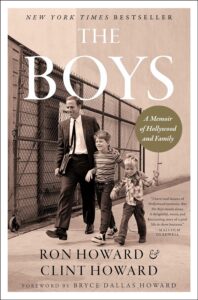Ron Howard & Clint Howard
William Morrow, 2021.

Ron Howard has for decades been a highly successful film director. Many will know him best as Richie Cunningham in the TV series Happy Days. Ron’s brother, Clint, is a successful actor including as a young boy in the TV series Gentle Ben.
It is a joint memoir from their childhood to their early twenties. As a fan of Happy Days, I was hoping to read a lot from Ron about that experience, but it is not until page 242 do we get the first reference to it. This is because prior to Happy Days, Ron had been a child star on a TV series The Andy Griffith Show and was then in the George Lucas film American Graffiti. Much of the book covers that earlier period.
This is a ‘nice’ book in that Ron and Clint write appreciatively about their parents and the values that they instilled. It does not hide from the difficulties, such as Ron’s being bullied at school for being on TV, and Clint’s struggles with drugs and alcohol. Clint writes:
“My belief is that I came preloaded with alcoholism and drug addiction. I don’t think I “developed” a problem – I was born with the disease, like my granddad Butch. All I was waiting for was access and opportunity.” (Page 265).
When Happy Days started, Ron had the lead role of Richie Cunningham, and Henry Winkler had the minor role of Arthur Fonzarelli (‘The Fonz’ / ‘Fonzie’).
“Fonzie arrived fully formed. He already did the thumbs-up gesture. He already had that magical wordless bit where he pulled the comb from his back pocket, checked himself out in the bathroom mirror, and acknowledged with a confident shrug that he looked perfect as he was. Off camera, Henry had a menschy, almost professorial manner of speaking, but as Fonzie, his speech assumed a jabbing, edgy cadence. “Don’t knock it ‘til you’ve tried it, Cunning-ham.”” (Page 285).
The Fonz became a phenomenon, and the Studio executives jumped on that success, making the Fonz the main character and paying Henry more than Ron.
“The Third Season of Happy Days […] The three-camera format, the studio audience, and the more pronounced emphasis on Fonzie made the show bigger than ever. Lowell Ganz and Mark Rothman wrote a sharp script for the season opener, “Fonzie Moves In,” which set up the circumstances for the Fonz to become the Cunningham’s tenant, living in a little apartment above their garage. Now it was plausible for him to be in our house all the time, not just at Arnold’s local hangout.” (Page 309).
Ron had to cope with being sidelined, whilst at the same time having a personal friendship with Henry.
“I obligingly did tons of interviews for Happy Days, but I couldn’t get through a single one of them without a reporter asking me some version of the question, “So how does it feel that Fonzie has taken over your show?”
As much as I tried not to let this get to me, sometimes it did.” (Page 313).
Henry was sensitive to this and broached the subject with Ron:
“Season Four of Happy Days began in 1976 […] Henry called me and asked if he could hitch a ride […] He wanted to have a talk. […] Henry said. “How do you feel? Because look, I know what’s happening. The Fonz is taking off and the show was designed for you to be the star. And they just gave me a big raise.” […] I had not been waiting for Henry to come to me and clear the air. We were friends; whatever anger I had in me was never directed at him. But it was so gracious and thoughtful of him to make this conversation happen.
“I don’t want anything to change about our friendship,” Henry said.
“I love you, Ron.”
“I love you, Henry,” I said.
We still do. He is the godfather to all four of my children.” (Pages 329-330).
February 2024
Adrian Vincent